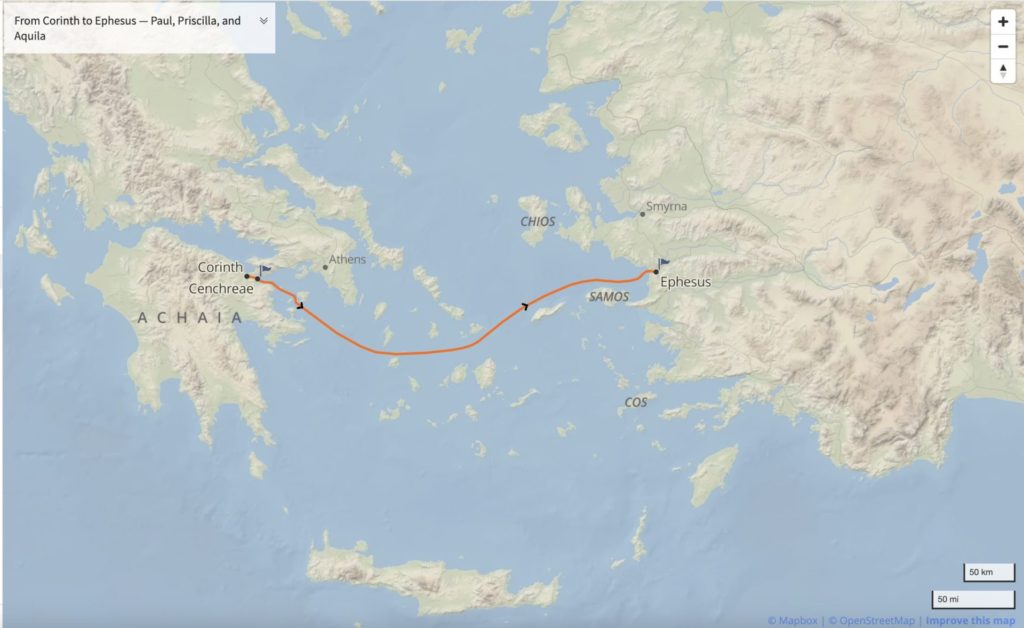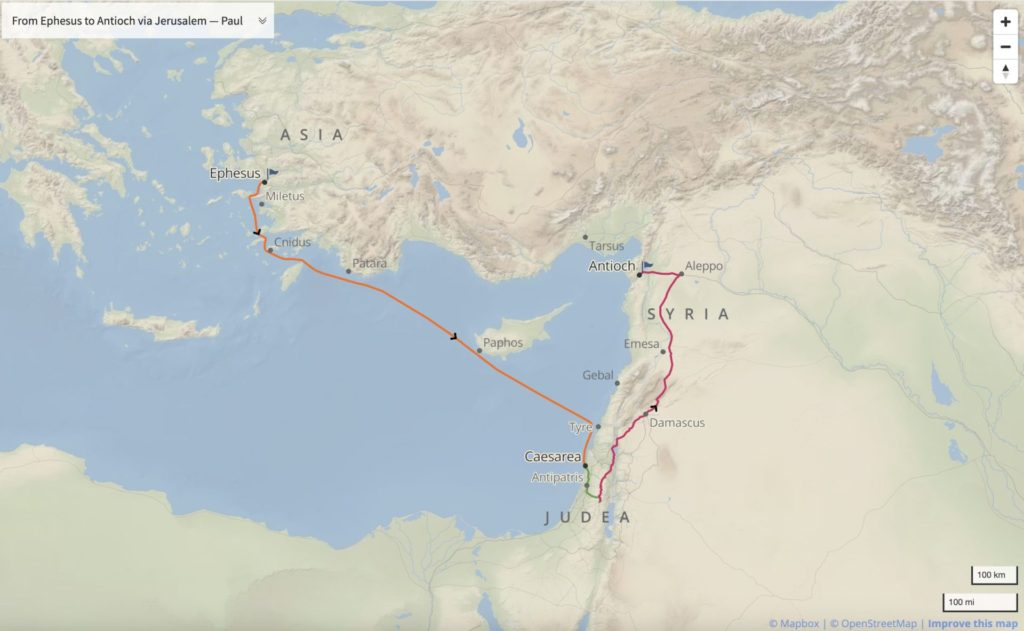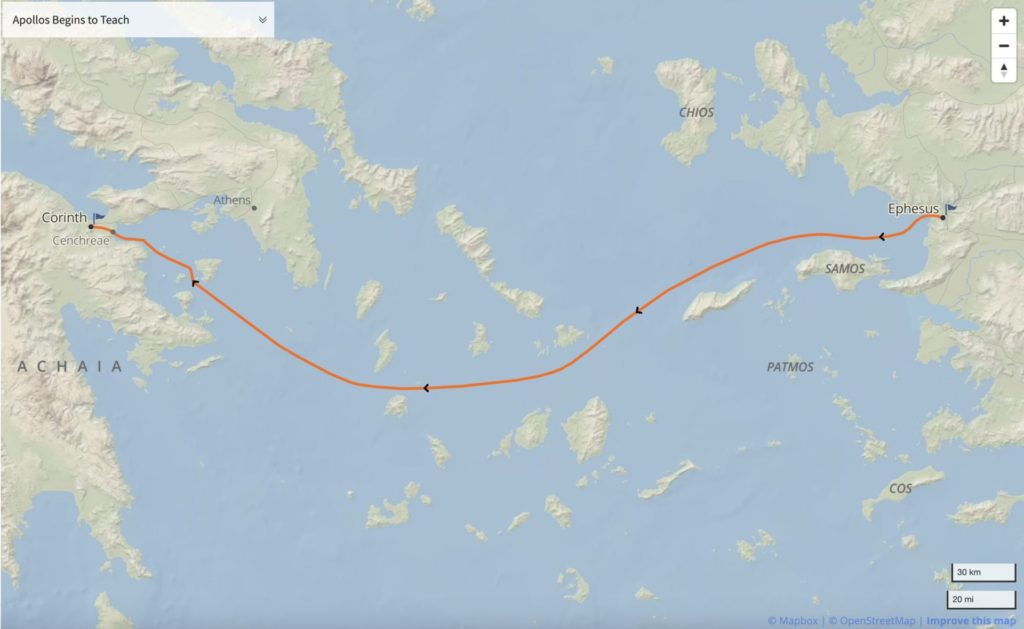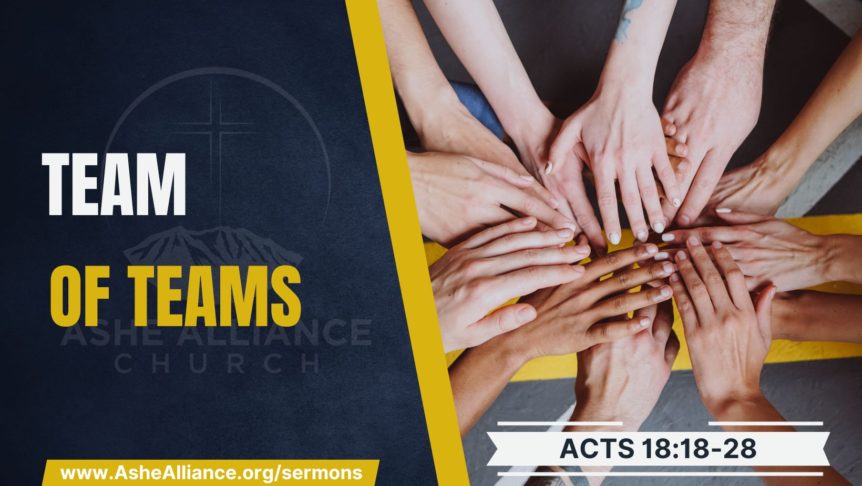WATCH
LISTEN
READ
Main Idea
Each part must function for the Body to grow and thrive.
When I joined OCC, I joined a three-man team. When I left, we had an eleven-man team. Frank Lehti led our Int’l logistics team and was a machine. The man never slept. He was always going and always thinking ahead. As we grew, he gave us a book to read called Team of Teams, written by General Stanley McChrystal, which puts the reader in the army’s command center as they hunt Al Qaeda operatives. The book details their journey from a frustrating and rigid hierarchy that kept them ten steps behind the enemy to crafting effective, nimble teams that caught up with and defeated them. By reading and reviewing that book together, he empowered us to have authority and make decisions between teams at our own levels. We became an effective team that could take the ball and run with it within our sphere of influence and authority.
Today, we will follow Paul as he ends his second missionary journey and begins the third, and we will also meet a fiery apologist named Apollos. These are two strong leaders who significantly impact the community they minister to, but that isn’t all that is happening here. Looking a little closer, you will see people operating at multiple levels. As we review these two stories, we see the whole body of Christ functioning together and providing a host of practical applications for us today. Instead of studying Paul and Apollos, I want us to see the Christ-exalting work of the 1st-century team of teams.
Let’s review the passage together now through that lens.
Passage
Acts 18:18–28 ESV
After this, Paul stayed many days longer and then took leave of the brothers and set sail for Syria, and with him Priscilla and Aquila. At Cenchreae he had cut his hair, for he was under a vow. And they came to Ephesus, and he left them there, but he himself went into the synagogue and reasoned with the Jews. When they asked him to stay for a longer period, he declined. But on taking leave of them he said, “I will return to you if God wills,” and he set sail from Ephesus.
When he had landed at Caesarea, he went up and greeted the church, and then went down to Antioch. After spending some time there, he departed and went from one place to the next through the region of Galatia and Phrygia, strengthening all the disciples.
Now a Jew named Apollos, a native of Alexandria, came to Ephesus. He was an eloquent man, competent in the Scriptures. He had been instructed in the way of the Lord. And being fervent in spirit, he spoke and taught accurately the things concerning Jesus, though he knew only the baptism of John. He began to speak boldly in the synagogue, but when Priscilla and Aquila heard him, they took him aside and explained to him the way of God more accurately. And when he wished to cross to Achaia, the brothers encouraged him and wrote to the disciples to welcome him. When he arrived, he greatly helped those who through grace had believed, for he powerfully refuted the Jews in public, showing by the Scriptures that the Christ was Jesus.
Outline
I – Paul’s encouragement
II – Apollos’s teaching
III – The Church’s activity
I – Paul’s Encouragement
We’ve seen Paul’s tenacity and theological rigor in past cities, but in today’s passage, he takes on the role of an encourager. Evidently, Barnabas’s nature had rubbed off on him.
Corinth to Ephesus

Ephesus to Antioch (via Jerusalem)

Ephesus – Paul was forbidden to travel here earlier. Now, Ephesus takes center stage here and throughout all of chapter 19. This shows us dependence on God’s timing, not our own. It was the 3rd largest city in the Roman Empire at this time, which gave it political significance. It is a coastal town on the Aegean Sea, on the western shore of modern-day Turkey, which gives it logistical significance. It was under Roman control, yet still a free Greek city with its own senate, giving them a fair amount of autonomy, and they had great pride in their great Temple of Artemis, which gave them spiritual significance.
To Pricilla and Aquila
He mentored them for over a year and a half in Corinth as they ministered and made tents together.
He trusted and worked so well with them that he took them to Ephesus. They had to take their tentmaking business international!
To the church
Paul encourages and spends time with the church in Jerusalem and Antioch. Jerusalem is not mentioned by name, but by nickname as “the church” that he went up to from Caesarea and down to Antioch. Paul likely gave a status update and worshiped with them before traveling north to his base of operations, where he probably did the same as he wintered there.
Paul strengthens believers from previous church plants. The transition from his 2nd journey to the 3rd isn’t so clear, but when we see Paul launch out from Antioch again, he begins by visiting the churches he established during his first journey. Paul knew some of the issues they were facing (such as the angry Jewish leaders and Judiazers), so he understood their need for encouragement.
In his devotion
In the Nazarite vow (Numbers 6:1-21). We don’t know why, but we can glean an important life application. Though he was free in Christ and liberated from the regulations of the OT Law, he was also free to perform them. Many commentators agree that Paul’s purpose for this vow was a demonstration of gratitude for God’s divine protection promised in Corinth, which was done in a way that was winsome to the Jewish people. In a way, this is Paul becoming all things to all people so that he might win some to Christ.
In his love for the Jews. Though he didn’t stay long, he kept to the gospel pattern of going to the Jew first, then the Gentile. He went to the synagogue first to reason with them, and it had an effect because they asked him to stay longer!
In his dependence on God’s will
This is the core verse of this section. While Paul is encouraging the believers (literally everywhere), he is also teaching and encouraging them to depend on God. I’m sure Paul had ideas of his own. I’m sure he wanted to stay in the cities where the gospel was converting thousands. Despite his own plans, he learned how to submit his will to the will of the Father. We know his heart for the Jewish people. We know he was willing to be cursed if it meant his people would believe in Jesus as the Christ, and yet, when they showed signs of interest and intrigue, he didn’t commit to staying. Rather, he said, “I will return to you if God wills.” How are you doing in this area? Are you submitting your will to the Father’s will? If He has crafted a plan for us to walk in, we can trust that His will shall lead us to places that will most glorify him and be the most beneficial for us (not necessarily the most comfortable, but the most beneficial, spiritually speaking).
The church needs a variety of nutrients to grow strong and mature spiritually. Paul had already laid a theological foundation for them, built on Christ as the cornerstone. Now, he is watering these tender plants with encouragement. I pray we will be likeminded to those in this church. I pray that God will give us eyes to see who needs encouragement right now and give us feet that are quick to draw near.
Those are the actions of our first leader. Let’s look at the second.
II – Apollos’s Teaching
Ephesus and Achaia

Apollos was from Alexandria – the Oxford of N. Africa—a major center for learning, given that they had one of the largest libraries in the empire. There was a Jewish presence here, and is where the Septuagint was made during the Ptolomyach empire (the Greek version of the OT).
While Paul acted more like Barnabas as an encourager, Apollo acted like Paul as a bold apologist. He was an educated Jew from the Egyptian Oxford who was well instructed in the ‘way of the Lord,’ aka, Old Testament Scriptures and Jewish traditions.
Taught from who he was
Eloquent – logios – learned and cultured.
Competent – dynatos – powerfully well-versed and capable. Mighty in the scriptures.
Fervent – Zeo – enthusiastically on fire, burning with zeal, lit.
Was teachable
He taught accurately about Jesus, but he had knowledge gaps. He knew only the baptism of John, which means he knew about the Messiah. He may even have known that John declared Jesus to be the Messiah (behold the lamb of God that takes away the sin of the world). Still, because of how Luke worded that statement, he likely didn’t know about the baptism of the Holy Spirit or how the Great Commission was being fulfilled. This is where our dynamic duo comes into play.
Apollo received corrective feedback from Pricilla and Aquila. He wasn’t wrong in what he did say, but there was a lot he wasn’t saying. So, the husband-wife team took him aside and filled in the gaps in private. They coached, taught, and equipped him to be more effective. They were a team of teams: they invested in Apollos, and Apollos humbly received their instruction.
Whether you are ten or ninety – a new Christian or have an MDiv – if you want to be an effective witness for Christ, you must be humble and teachable.
Taught everywhere
Apollo taught the believers in Ephesus with the information he had at the time. We need to hear this today – Apollos did not let a lack of knowledge or experience stop him from being active. He worked with what he had. You might not be a theologian or have logged hundreds of hours in Bible study, but if you have received Jesus as Lord – repenting from sin and turning to Him for forgiveness and life, you have a testimony. You are equipped to witness from day one. We will always have knowledge gaps. Emulate Apollos and start from where you are.
Apollo helped the believers in Achaia by defending the faith and refuting adversaries in public. As he increased in knowledge and fervor, he became more effective. Defending the faith was his gift; he gave it 100% wherever he went. In fact, he is mentioned multiple times in 1 Corinthians because of his success.
That’s leader number two. Now, look at the church body and finish with some meaningful applications.
III – The Church’s Activity
Priscilla and Aquila
- Priscilla and Aquila learned from Paul
- Priscilla and Aquila put their lives on the line for the gospel
- Priscilla and Aquila made their business mobile and remained in Ephesus to serve the church
- Priscilla and Aquila discipled Apollos, willing to pour themselves into other people
- Priscilla and Aquila are influential coaches and disciple-makers with sacrificial, willing hearts
The congregation
But, that’s not all! The brothers in Ephesus encouraged and edified Apollo when he wanted to travel to Achaia. They edified this new and budding leader.
The brothers in Ephesus communicated with the disciples in Achaia so that Apollo would receive a warm welcome. They were a team of teams who demonstrated that the body of Christ is not just one local congregation but all believers everywhere.
In modern terms, the church in the passage today operated as a team of teams. In biblical terms, they functioned as the body of Christ, each working as God has designed and equipped them. The story isn’t about specific details about two men. It is about the function of the entire body.
As we see the body function with all of its parts, we can glean eight takeaways to help us be actionable at Ashe Alliance.
Takeaways
1. Knowledge with passion
2. Encouragement with teaching
3. Guidance from God’s will and God’s people
4. Active participation from the leaders and the congregation
5. Instruction given in private and in public
6. Members giving instruction and receiving instruction
7. Humble and actionable
8. Be mighty in the scriptures
